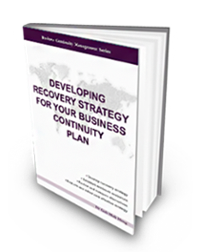[P2] Finalising Your Business Continuity Strategy
As part 2 of the BCM-5000 Module 3 Pre-reading List, this section prepares you to compile and present the Business Continuity (BC) Strategy Report to Executive Management.
This is the first step in understanding how to develop a structured, actionable BC strategy that aligns with your organisation’s resilience objectives.
Upon completing BCM-5000 Module 2, you will have acquired the competencies of a Business Unit (BU) BCM Coordinator, including hands-on experience with the BC Strategy Questionnaires.
This stage helps you grasp the objectives and challenges of formulating a BC strategy at the business unit level.

As you advance to Modules 3 and 4, you will assume the role of Organisation BCM Coordinator.
In this role, you will analyze the collected data and present the BC Strategy findings in a comprehensive report for Executive Management approval.
This content is adapted from the BCM Planning Series: Developing Recovery Strategy for Your Business Continuity Plan. It provides a structured approach to designing and implementing an effective BC strategy.
A well-defined BC strategy is the foundation of organisational resilience, ensuring business operations recover swiftly from disruptions.
Are you ready to take the next step in strengthening your organisation’s continuity framework? Let’s get started.
Validate Business Continuity Strategy Development
 This blog provides the essential know-how to validate the BCS once developed. You are expected to receive individual BC Strategy submissions from each business unit.
This blog provides the essential know-how to validate the BCS once developed. You are expected to receive individual BC Strategy submissions from each business unit.
The assumption is that the BU BCM Coordinators had their submission reviewed and endorsed by the respective heads of BU.
Understand Issues to be Considered
The following issues must be considered during this BC Strategy stage:
- What is the total time taken to declare a disaster?
- Is the staff members available following a disruption?
- What will be the restriction when there is any relocation of staff members?
- Should the alternate site be able to accommodate more operations, or should the stay be extended?
- Is working from home (WFH) arrangement suitable for critical business functions?
- Are technology and internet access available while working from home?
- What is the maximum time the business unit can stay at the alternate site?
- What is the time taken and resources needed to implement the BC Strategy?
- Are there existing processes to recover?
- Do we need to develop additional standard operating procedures?

 It is important to clarify all outstanding issues, including the agreed-upon way forward, before commencing the next stage.
It is important to clarify all outstanding issues, including the agreed-upon way forward, before commencing the next stage.
I often use a “parking lot” flip chart to list the outstanding issues during training sessions.
Participants must be delegated to address the items on the list, and you must monitor their completion.
Some of these issues are long-term and may need more time to resolve with management approval.
Validate Interoperability
There is a need to verify the interoperability of each specific BC Strategy operating outside if the primary site to the following:
- Similarity to the actual operating environment
- Deployment of resources
- Relevance to existing operating procedures
- Inclusion in the contractual agreement
Determine Data Loss Scenario
An organization’s BC Plan will minimize the impact of a disaster. Yet, there is always a possibility that some data could be lost in a disaster. It is, therefore, critical to identify the potential data loss for your critical business function.
Your ability to recover your critical business function will rely heavily on your ability to identify and reconstruct the lost data or to recreate the data from other forms, such as manually written documents.
Discussions with the BU BCM Coordinators and their managers will help the BU Coordinators determine the types of data that may be lost during any interruption, mainly when it occurs after office hours.
These include:
- Dependency on work-in-progress and data left onsite
- Inability to recover lost data
- Failure to reconstruct lost data and process backlog
 The BCM Project Manager or Organisation BCM Coordinator will need to explain the data loss scenario to the BU BCM Coordinators as they need to provide inputs to the following questions:
The BCM Project Manager or Organisation BCM Coordinator will need to explain the data loss scenario to the BU BCM Coordinators as they need to provide inputs to the following questions:
- When did you last back up your data?
- How frequently is data transferred offsite?
- Is the data stored offsite or onsite?
- Can you access the backup data during weekends and public holidays?
- If data (document) is destroyed on a working day, can you still reconstruct the data offsite? If “no”, how can you survive?
- Do you have a complete understanding of the issues and limitations?
- Is there adequate documentation on the processing?
- Is the necessary skillset and knowledge retained within the organization?
Identify Operational Changes
The Organisation BCM Coordinator must identify operational changes necessary for strategy development. These include:
- Revise existing standard operating procedures that are affected by the adoption of the newly developed recovery strategy
- Increase cross-training of team members
- Reorganise or even re-engineer the workflows
- Update performance standards
- Increase protection of work-in-progress
More Information About Business Continuity Management Courses
To learn more about the course and schedule, click the buttons below for the BCM-300 Business Continuity Management Implementer [BCM-3] and the BCM-5000 Business Continuity Management Expert Implementer [BCM-5].




![Register [BL-B-3]*](https://no-cache.hubspot.com/cta/default/3893111/ac6cf073-4cdd-4541-91ed-889f731d5076.png)



![FAQ [BL-B-3]](https://no-cache.hubspot.com/cta/default/3893111/b3824ba1-7aa1-4eb6-bef8-94f57121c5ae.png)
![Email to Sales Team [BCM Institute]](https://no-cache.hubspot.com/cta/default/3893111/3c53daeb-2836-4843-b0e0-645baee2ab9e.png)





